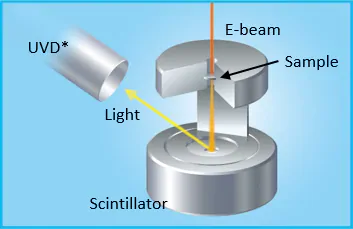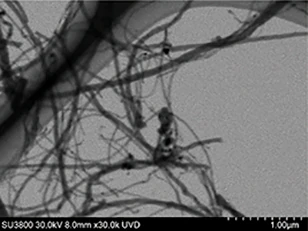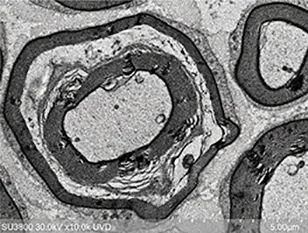3.Integrated Solutions for Various Applications
■A Variety of Accessories Mountable on Any of the 20 Ports on the Innovative SU3900 Specimen Chamber.
The SU3900 is equipped with a large multipurpose specimen chamber to accommodate observation of large samples.
■SEM/EDS Integration System*
The newly developed SEM/EDS integration system unifies stage location, condition setting, analysis, reports, and a series of operations from the SEM graphic user interface of the SU3800/SU3900. Controlling everything from the SEM graphic user interface improves throughput and reduces operator tasks.
*optional
■High Sensitivity Detectors Supporting All Observation Requirements
- CL Observation Using UVD*
The SU3800/SU3900 feature a high-sensitivity UVD. UVD can acquire images and CL information with secondary electron information by detecting the light generated by collisions of secondary electrons and residual gas molecules accelerated by a bias electrode.
- Segmented BSED allows for visualizing composition and topography
With a 5-segment design, it is possible to observe composition images, 3D images, and topographic images from 4 directions without sample rotation. Due to the design and high sensitivity of the detector, high-resolution imaging with improved S/N retention is possible.
■STEM holder (Option)
- Easily obtain transmitted images on thin samples
The newly developed STEM holder can be used to perform transmission images
with the Hitachi UVD. Images of thin or biological samples can be obtained.

*UVD is a function of SU3800 and SU3900.

Sample : CNT
Accelerating voltage : 30 kV
Image signal : STEM
Magnification : 30,000x

Sample : Sciatic nerve section
Accelerating voltage : 30 kV
Image signal : STEM
Magnification : 10,000x
■3D Modeling Software: Hitachi map 3D*
Hitachi map 3D automatically combines 4 images acquired from different directions using the backscattered electron detector to construct a 3D model. Measurements such as height between two points, volume, and simple surface roughness (area roughness, line roughness, etc.) are possible. Since all backscattered electron data is collected in a single acquisition, it is not necessary to tilt the sample or adjust the field of view.
■Image Processing, Measurement, and Analysis Software: Image-Pro® for Hitachi
The SU3800/SU3900 feature IPI, which transfers SEM images to advanced image-processing software (Image-Pro® manufactured by Media Cybernetics Inc.). The operator can transfer data from SEM images to sophisticated image-analysis software with just one click.